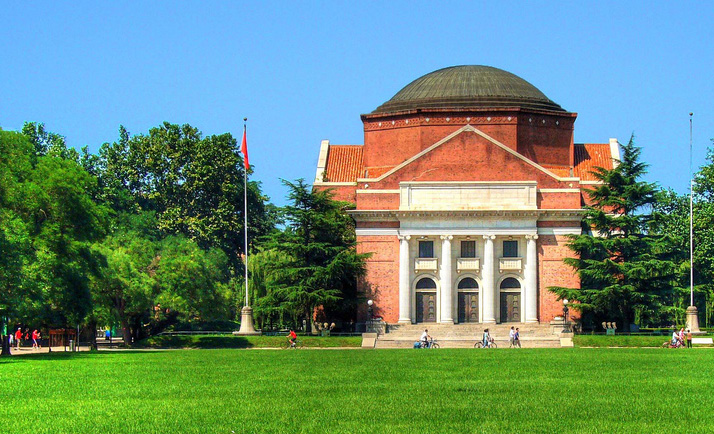
The central green of Qinghua (or Tsinghua) University in Beijing. Photo © Jon Parry, licensed Creative Commons Attribution.
China’s higher education system includes universities, which function similar to Western universities, and technical colleges that provide vocational training in skills such as manufacturing, cosmetology, cooking, and technology. Students’ test scores determine their options. There is no community college or junior college system, but a growing number of small private schools are filling in the gap. Unlike the universities, the private schools often don’t require minimum test scores. Students come from all over the world and study just about every subject, including the arts, agriculture, economics, and both Western and Chinese medicine, but Mandarin remains the most popular.More than 50 Chinese universities accept foreign students. Beijing is the top destination for most, with Qinghua and Beida Universities at the top of the list. Shanghai is the second most popular study city, and Fudan and Jiaotong are the preferred schools. Other popular choices include Zhejiang University in Hanghzou, China’s largest university and one of the top five academically, as well as Xiamen University, which has the added benefit of being near the beach.
Students come from all over the world and study just about every subject, including the arts, agriculture, economics, and both Western and Chinese medicine, but Mandarin remains the most popular. You needn’t know any Mandarin to enroll in language classes; you can start out in a beginning class. Most foreign students who plan to study other subjects often start out with a year or two of Mandarin first. Some programs are taught completely in English or with a mixture of the two languages.
Despite the fact that China’s education is so inexpensive that scholarships aren’t even necessary, the Chinese government has earmarked over $70 million for scholarships specifically for foreigners and has recently allowed a few of the top colleges like Zhejiang University to grant their own scholarships as well.
The Chinese university system is almost identical to the U.S. system, with bachelor’s, master’s, and doctorate degrees awarded. As in the United States, the academic calendar consists of a fall and spring semester, and most schools also have intensive summer programs. Admission is typically limited to the fall semester, which generally starts around September 1, so you’ll need to apply in the spring at the latest. Be aware that at this point in time, a degree from a Chinese university may not be recognized by a Western employer, especially an academic one, and credits from a Chinese university might not transfer to a Western university.
The tuition for one year of undergraduate study at Zhejiang University is around $3,200-4,800; master’s and doctoral study ranges $3,600-6,400. A two-person room at the International Student Dorm rents for around $200 per month. You’ll shell out another $1,000+ for cafeteria meals. In comparison, a year of medical school at a less famous university will only put you out $3,000-4,000 a year, and that includes dorm and meals. Realistically, you’ll need a few thousand more for traveling and for the psychological benefits of having a Western meal once in a while, not to mention all the karaoke and discos your classmates will drag you to.
Excerpted from the Second Edition of Moon Living Abroad in China.